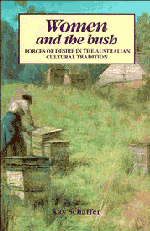Book contents
- Frontmatter
- Contents
- ACKNOWLEDGEMENTS
- INTRODUCTION
- Dedication
- CHAPTER 1 CULTURE, LANGUAGE AND THE SELF
- CHAPTER 2 IN SEARCH OF A NATIONAL IDENTITY
- CHAPTER 3 THE BUSH AND WOMEN
- CHAPTER 4 LANDSCAPE REPRESENTATION AND NATIONAL IDENTITY
- CHAPTER 5 HENRY LAWSON: THE PEOPLE'S POET
- CHAPTER 6 BARBARA BAYNTON: A DISSIDENT VOICE FROM THE BUSH
- CHAPTER 7 CONCLUSION
- NOTES
- BIBLIOGRAPHY
- INDEX
CHAPTER 2 - IN SEARCH OF A NATIONAL IDENTITY
Published online by Cambridge University Press: 10 January 2011
- Frontmatter
- Contents
- ACKNOWLEDGEMENTS
- INTRODUCTION
- Dedication
- CHAPTER 1 CULTURE, LANGUAGE AND THE SELF
- CHAPTER 2 IN SEARCH OF A NATIONAL IDENTITY
- CHAPTER 3 THE BUSH AND WOMEN
- CHAPTER 4 LANDSCAPE REPRESENTATION AND NATIONAL IDENTITY
- CHAPTER 5 HENRY LAWSON: THE PEOPLE'S POET
- CHAPTER 6 BARBARA BAYNTON: A DISSIDENT VOICE FROM THE BUSH
- CHAPTER 7 CONCLUSION
- NOTES
- BIBLIOGRAPHY
- INDEX
Summary
When critics and commentators set out to define Australian culture and construct a national mythology which would mark the country's distinctive difference from England, they scarcely registered the presence of women—as historical figures whose presence helped to shape and alter perceptions of the landscape; as settlers and citizens with roles to play in social and political life; as writers who contributed significantly to the literary and cultural heritage; or as contributors to a cultural discourse which shaped the distinctive battles between fathers and sons. The ‘definitive’ texts of the twentieth century, beginning with Nettie Palmer's Modern Australian Literature (1924) and W. K. Hancock's history, Australia (1930), and continuing through cultural studies like Vance Palmer's Legend of the Nineties (1954), A. A. Phillips' The Australian Tradition (1958), and Russel Ward's The Australian Legend (1958), constitute the makings of a nascent discourse on national identity. They posit an image of the bushman-as-hero, as ‘ideal type’ who represents the national ethos of mateship. These texts and others which follow purport to construct the history of Australia from the inside, by writers who identify themselves with the cause of Australian nationalism. The selective ordering of the facts of national life encodes a history of the nation from early settlement, through Federation, to the present in terms of unique characteristics which are said to define an Australian identity.
- Type
- Chapter
- Information
- Women and the BushForces of Desire in the Australian Cultural Tradition, pp. 28 - 51Publisher: Cambridge University PressPrint publication year: 1989



